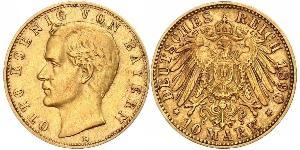5 Mark (Vendida por $112.0)
1911, Bavaria, Prince Regent Luitpold. Large Silver 5 Mark Coin. PCGS MS-63!
Mint Year: 1911 Reference: KM-999. Mintage: 160,000 pcs. Condition: Certified and graded by PCGS as MS-63! Denomination: Silver 5 Mark - Struck for the 90th birthday the Prince-Regent! Mint Place: Munich (D) Diameter: 38mm Weight: 27,7gm Material: Silver
Obverse: Head of Prince Regent Luitpold of Bavaria right. Legend: LVITPOLD PRINZ. REGENT V. BAYERN / D Exergue: 1821 . 12 MAERZ . 1911 Reverse: Crown of the German Empire above heraldic eagle of Germany with shield at chest and star order. Legend: DEUTSCHES REICH 1911 * FÜNF MARK *
Luitpold, Prince Regent of Bavaria (German: Prinzregent Luitpold Karl Joseph Wilhelm Ludwig von Bayern) (12 March 1821–12 December 1912), was the regent and de facto ruler of Bavaria from 1886 to 1912, due to the incapacity of his nephews, Ludwig II and Otto.
Luitpold was born in Würzburg, the third son of King Ludwig I of Bavaria and of his wife Princess Therese of Saxe-Hildburghausen. He was the younger brother of King Maximilian II of Bavaria and of King Otto of Greece. In addition to being in line to the throne of Bavaria, Luitpold was also heir presumptive to the throne of Greece since his brother Otto had no children. However, the Greek law of succession required that Otto's heir convert to the Eastern Orthodox Church in order to become king; Otto was not willing to do this. Otto was deposed in 1862 and replaced by a Danish prince who became King George I of Greece. Otto died in 1867, leaving Luitpold and his descendants as representatives of Otto's claim; however, Luitpold never pursued this.
During the rule of his brother Maximilian II (1848–64) Luitpold did not play a significant political role. With the reign of his nephew Ludwig II (1864-1886) Prince Luitpold had increasingly to represent the royal house due to the king's long absence from the capital. In the Austro-Prussian War in 1866 Luitpold was commander of the 3rd Division. In 1869 he became Inspector General of the Bavarian army, during the Franco-Prussian War 1870/71 he represented Bavaria in the staff headquarters. As such he handed over on 3rd of December 1870 Ludwig's Kaiserbrief to the Prussian King William I offering the crown of the German Empire. In 1876 Luitpold was appointed field marshal.
On 10 June 1886, Luitpold's nephew King Ludwig II was declared mentally incompetent and Luitpold was named Regent. Luitpold's part is still controversial. Following Ludwig II's mysterious death a few days later, Luitpold continued to serve as regent for the new king, Otto, Ludwig's insane brother. Prince Luitpold was even accused by some people to be the murderer of his nephew, but soon the decent and affable prince became one of Bavaria's most popular rulers. One of his first actions (on 1 August 1886) was to open several of the palaces of Ludwig II to the public.
During the regency of Prince-Regent Luitpold relations between Bavarians and Prussians remained cold with Bavarians remembering the anti-Catholic agenda of Bismarck's Kulturkampf as well as Prussia's strategic dominance over the empire.
Luitpold continued to serve as regent until his death of bronchitis in 1912 in Munich, when he was succeeded by his eldest son, Ludwig. He is buried in the crypt of the Theatinerkirche in Munich.
Luitpold's years as regent were marked by tremendous artistic and cultural activity in Bavaria where they are known as the Prinzregentenjahre or the Prinzregentenzeit. Bavaria prospered under a liberal government and Munich became a cultural centre of Europe. Thomas Mann wrote about this period "Munich shone" (1902 Gladius Dei).
There are numerous streets in Bavarian cities and towns called Prin zregentenstrasse or Luitpoldstrasse. Many institutions are named in Luitpold's honour including the Prinzregententheater in Munich and the Luitpoldarena and the Luitpoldhalle in Nürnberg. In 1891 Luitpold established the Luitpold Gymnasium in Munich. Prinzregententorte is a multi-layered cake with chocolate butter cream named in his honour.
Luitpolds great passion next to the arts was hunting, his legendary hunts took place in the entire kingdom.
Only 1$ shipping for each additional item purchased!

|
Publicado por:
anonymous 2018-11-19 |
|
||
|
||
|
||
|
||
|
||
1 Thaler Reino de Prusia (1701-1918) Plata Wilhelm I, German ...
grupo tiene 18 monedas / 17 precios
⇑

-600-300-HkQ32loYIBkAAAFnT6gWgiqO.jpg)

-300-150-4vUKbzbipU8AAAFL_nT6AggR.jpg)
 English
English







-300-150-3NgKbzbiGXUAAAFROl9auyNq.jpg)






